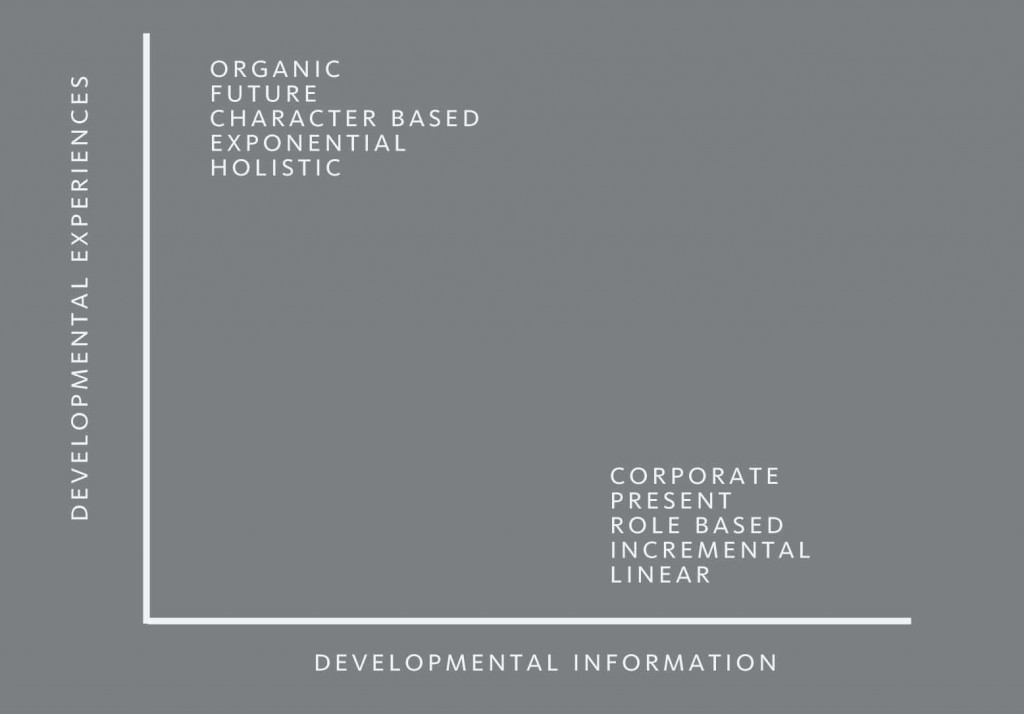Personal Development that’s provided by your ministry or organization offers the least resistance but often short circuits what’s actually needed to become more effective as a ministry leader.
a simple chart:
On the Y-axis is developmental experiences, which I define as experiences that increase both your skill and capacity in some leadership related area–giving speeches to large groups of people, working through conflict with someone, training another person are a few examples.
On the X-axis is developmental information, which over time when applied correctly and appropriately will increase skill and capacity–seminary classes and informational seminars are two examples.
Although I value developmental experiences more than information I do not think experiences are better than information. I do believe many ministry leaders miss out on the fruit of intentionally facilitating developmental experiences to enhance their effectiveness. It seems often that these leaders expect the fruit of developmental experiences from developmental information–it just doesn’t work that way.
Here are some ways I have found to avoid leaning too heavily on developmental information:
- Take on short-term roles OUTSIDE of your daily/regular ministry context: giving leadership to a conference, or leading a seminar, or hosting your own webinar on a topic in which you excel all provide developmental experiences that will keep you sharp and growing.
- Consider how God wants to use the people on your team to expand your leadership capacity. That person who thinks differently than you at almost every turn is not just annoying but actually part of God’s sovereign and loving process of development. It’s not about BECOMING what you are weak in but internalizing the spiritual fruit to love and lead those who are different than you well.
- Go to a conference OUTSIDE of your ministry context: similar to the first, but a conference will not only expose you to developmental information that is different than what you are used to hearing (you’ll realize your organization doesn’t know everything), but will surround you with people who see the world similarly yet different. It’s money well spent to reap these benefits.
Any tips on how to avoid getting stuck developmentally?


here’s a couple tips.
1. doing something is better than doing nothing (unless you’re in fact doing the same things and taking in the same content and information that you have before – which is often what many trainings do anyway)
2. identify clearly what your organization is trying to train you to do. Then figure out what things would help you do it better. Many people go through org. trainings without ever thinking about what they truly need to do their job. And then there’s the fact that many trainings were designed 10 years early and things are moving so fast that job descriptions and needed capacities are changing faster. It’s faster to go out and find out things that cutting edge people are doing out there than to wait for someone to come up with new training. Then if it’s not good you’re doubly disappointed – because you were waiting too long and because it’s not good anyway.
i used to get so frustrated that org trainings left out some piece or didn’t address something i thought was critical–then i realized those were areas that I needed to pursue outside of org trainings if i really wanted to see development.
what you wished you were trained more in is often the signal of deep passions that need training beyond what is offered to everyone.
Brian,
Great post. Loved the part about how the person who annoys you is part of your development. Too often we treat that person as if they have a character flaw that needs fixing. In reality it is us.
Seminaries emphasize developmental information often to the exclusion of experiences. “Get trained for ministry” really just means “come learn about ministry”. The system is broken but hard to fix.
hey eric thanks!
i functioned that way (treating others as needing fixed) early on in my staff career a lot, and it really hindered my team relationships.
re seminaries: the linear part of information has to be a huge factor in avoiding or the limited opportunities to have developmental experiences–they are also harder to facilitate on the front and back end.
seth godin basically sought to provide an alternative model for the traditional mba and wrote this:
Here’s what I told the group, “Maybe the most important thing you’ll learn in this program is that you don’t need this program. There’s not much I’m going to tell you that’s not in my blog posts or books. What this program will do is give you the structure and support to encourage you to do what you already know. But you can do that by yourselves.” I think that’s true for the people who weren’t able to be part of it as well.–http://sethgodin.typepad.com/seths_blog/2009/06/learning-from-the-mba-program.html
very appropriate for the context of this post as well…
One thing I’ve found really helpful is asking leaders out to lunch. Usually leaders I wouldn’t bump paths with frequently. I’ve found these times challenging and engaging.
nice russ. that environment seems to open up space for great conversation.